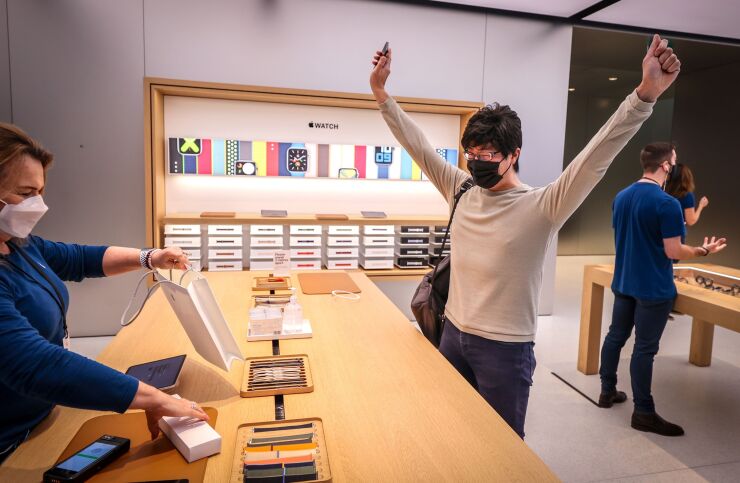Fintechs' rush into the installment lending market creates a threat to the banks that got there first. But for the banks that sat on the sidelines, the best course forward might be to partner with a fintech rather than push back.
The earliest movers, such as Citizens Bank of Providence, R.I., have already claimed the biggest clients. Citizens developed a customized financing approach for Apple’s iPhones six years ago, and that work is paying off now, said Eric Schuppenhauer, head of consumer lending and national banking.
Xbox All Access, a financing option for Xbox consoles, is another implementation of Citizens' buy now/pay later services, and the bank is seeing strong growth now in categories including furniture, fitness and health care.
“We didn’t create this overnight — we started in 2015 — and we’ve got a lot of investment, a lot of technology and thinking that went into developing this product set and it’s not something that’s easy to enter,” Schuppenhauer said.

As with credit cards, the goal is to be the top-of-wallet choice at the point of sale.
“There is a distinct first-mover advantage, because the merchant commits to a BNPL platform they’re not likely to move it,” said Richard Crone, a principal with Crone Consulting LLC.
What consumers like about BNPL loans is greater flexibility and predictability around payments, where buyers can essentially choose their own terms by deciding how much to pay back, and over how many months.
Merchants who see how the digital channel is driving more online sales also see the need for instant financing in that environment, Schuppenhauer said.
“A lot of retailers wanted to add BNPL for survival during the pandemic, but I think it’s a trend that’s going to sustain as people have changed their [shopping] behavior,” he said.
What fintechs brought to bear on consumer lending was software development kits and APIs, enabling a turnkey process for merchants to add instant financing online or at the point of sale, and banks are now racing to add on those capabilities through partnerships and acquisition.
The concept of originating loans with merchants is not new, as Capital One, Wells Fargo, Citibank, Synchrony and others have provided similar services for years to merchants with private label cards.
“What’s new is offering customized credit with machine learning that opens up the available FICO score range for point-of-sale lending as all the fintechs are doing minus a card,” Crone said.
Some large merchants are offering multiple traditional credit card and installment-loan financing options online, but as BNPL expands to in-store purchases, the preferred model there will likely be using one provider, Crone said.
“The challenge for merchants on the e-commerce and in-app side is keeping it simple and straightforward, and they’re not likely to want more than one BNPL provider, especially for installment loans offered in stores, which is going to be the next big wave of growth in this area as we come out of COVID-19,” Crone said.
For private-label lenders, one of the challenges is working out the economics on existing private-label card offers versus installment loans, which typically target younger consumers but also appeal to existing card borrowers who want to buy certain items with different terms.
Alliance Data, which provides private-label credit cards to a number of U.S. merchants including apparel marketers, last fall acquired BNPL tech provider Bread for $450 million as another way to fast-track installment lending tools for merchants.
The deal was finalized in December and Alliance this week announced a partnership extending Bread's BNPL services to retailers using Fiserv's merchant acquiring services.
Bank technology platform providers Fiserv and FIS are meanwhile extending BNPL capabilities to smaller financial institutions, and the card networks have built BNPL engines available to card issuers.
Barclays US this week chose the partnership route, teaming up with Chicago-based fintech Amount to achieve rapid onboarding of merchants for white-label BNPL services. Barclays plans to market the solution to existing cobranded credit card partners and other merchants in coming months.
Unlike many fintechs that are going after merchants with BNPL offerings, Amount sees a greater opportunity in pursuing banks that need to offer installment loans.
“We are taking our solution directly to banks and we’re working to develop a fast process to bring them onboard,” said Adam Hughes, Amount’s CEO.
Merchants will have plenty of options to choose from as banks ramp up BNPL services and fintechs expand their menus of installment loans, said Ginger Schmeltzer, a senior analyst with Aite Group.
"Retailers — especially online — are increasingly willing to entertain multiple BNPL providers, because a consumer may prefer one or another installment lender," Schmeltzer said.
But banks have several advantages when rolling out BNPL options, she said.
"Lenders like Citizens and Barclays are known and trusted names, and that's better than being a completely unknown commodity. Banks also have a lower cost of funds and more tools on the loan-management side than fintechs," she said.
The next big wave in BNPL lending will be among smaller merchants, Schmeltzer predicts.
"Merchants of all sizes are seeing higher sales through installment lending and there's still a lot of growth opportunity here for banks and fintechs," she said.





